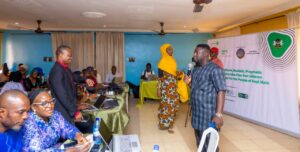


Lokoja, July 10, 2025
The Kogi State Government has trained health managers and planning officers on developing operational plans, with a focus on people-centered planning and effective implementation of the Sector-Wide Approach (SWAp) initiative.
The initiative is in collaboration with Federal Ministry of Health and Social Welfare, Nigeria Health Sector Renewal Investment Initiative (NHSRII), Nigeria Governors’ Forum, and Partners.
Declaring the four-day workshop closed on Thursday in Lokoja, the state Commissioner for Health Dr Abdulazeez Adeiza, said the SWAp) initiative would strengthening the state’s healthcare system.
Abdulazeez, represented by the state’s Director Health Planning Research and Statistics, Mr Johnson Aiyedogbon, said it was geared towards rational, realistic, pragmatic and comprehensive plan that informs health budget for the Kogi people.
Abdulazeez added that the initiative marks a major shift towards a more streamlined and effective healthcare system in the state.
He emphasised that it would tackle chronic issues in the health sector, such as inadequate financing, staff shortages, poor data management, and insufficient infrastructure.
He stated that the aim of the training was to build the capacity of participants and ensure that planning is bottom-up, allowing for the identification of necessary interventions from the grassroots level.
This approach, he noted, would lead to improved healthcare outcomes for the people of Kogi State.
The commissioner commended the Governor for his commitment to transforming the health sector in the state.
He reiterated the state’s commitment to improving health indices and generating verifiable data to inform decision-making and drive positive change in the health sector.
In his remarks, Mr Luter Orkar, the National Facilitator, SCO, Federal Ministry of Health, commended Kogi State for its commitment to the SWAp initiative, noting that it was the first state to cascade the training.
Orkar urged participants to collaborate, develop the political will, demonstrate leadership, and own the program to take the state health sector to where it ought to be.
Dr. Emmanuel Bola Jonah, Desk Officer, SWAP Kogi State, expressed appreciation to the Commissioner for providing leadership and galvanizing support for the workshop.
Jonah reiterated the commitment of SWAP Kogi State to improving health outcomes and reducing preventable deaths in the state.
Jonah explained that the workshop aimed to strengthen the capacity of health leaders in methodologies, problem-solving, and informed decision-making.
“The workshop aims to equip health managers with the necessary skills and knowledge to effectively manage health interventions at all levels.
“It will enable them to plan realistic and achievable activities that benefit the people of Kogi State.
“Additionally, it focused on strategies for implementing the 2026 Annual Operational Plan (AOP) and prioritising needs in the face of dwindling international funding,” Jonah said.
He stressed the importance of people-centered planning.
Jonah emphasised that the ultimate goal of the training was to improve health outcomes and reduce maternal mortality and child morbidity rates.
He stressed that the planning process should focus on the needs of the people, rather than assumptions, and that the state government had invested heavily in the training to achieve this goal.
The partners commended the state government for prioritizing the health sector and assured their continued support to help the state achieve its health goals.
They expressed optimism that their support would contribute to the state’s progress in the health sector.
The workshop drew 65 participants from the 21 Local Government Areas (LGAs) of the state, including health, program and planning officers, monitoring and evaluation officers, and key stakeholders in budget planning.
Participants were urged to implement the knowledge and skills acquired during the training in their various areas, ensuring that the investment made by the state government would yield positive results.
Mr. Jatto Haruna and Mrs. Esther Ajiboye, participants at the workshop, described the training as impactful, noting that it had given them a paradigm shift from the past.
They promised to cascade what they had learned to the local level to ensure effective implementation of the SWAp in the state.
End


